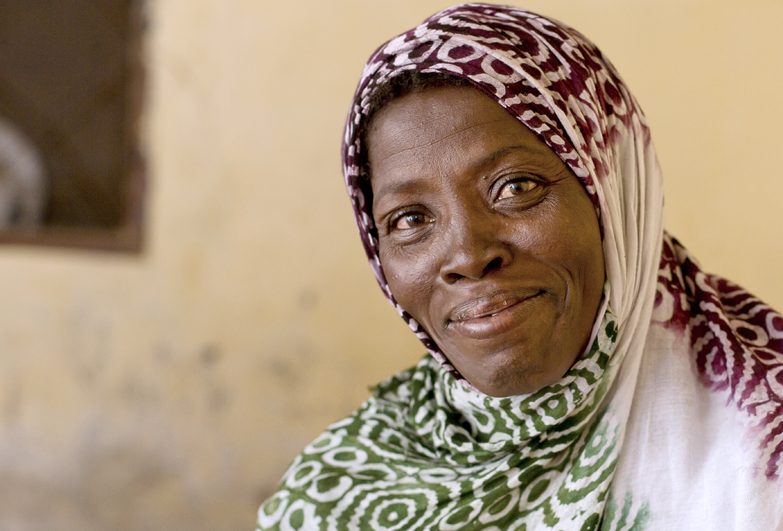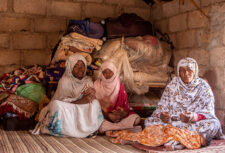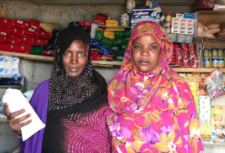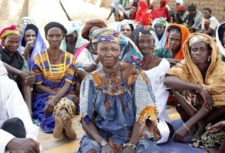Disclaimer: This article is more than 7 years old, and may not include the most up-to-date information or statistics. Please verify information with more recent sources as needed, and if you have any questions contact our Press Office.
Africa Programme Manager Sarah Mathewson on problems faced by Mauritanian women in slavery and beyond.

In the system of descent-based slavery in Mauritania both men and women are treated as property from birth and are subjected to a life of forced labour.
Yet experiences of women and girls in slavery are not only very different, they face far greater difficulties in leaving slavery.
In this system children born from a mother of a slave status are also considered slaves, and as such, women are an important and valuable resource for new slaves for their masters. Girls and women are therefore routinely subjected to sexual abuse and rape by masters and forced to bear their children.
This also means that girls and women are usually given duties in the domestic sphere, in order to restrict their movements and social interactions, and to prevent their escape or other threats to the sexual and reproductive control of the masters.
Inequality between the sexes can also make it much more difficult to escape from slavery.
Because women have dependant children, both the decision to run away into the unknown can be much harder to take, and the practicalities become much more demanding. Many times women have to take dramatic decisions to leave their children behind in slavery.
Indeed, over 80% of the slavery victims requiring assistance from our local partner organisation SOS-Esclaves are women.
Out of slavery
After achieving freedom, life is not easy for women. The law tends to work against them. According to the 2001 Family Code, women have the same legal status as children. Women escaping slavery are usually unmarried (masters usually forbid them from marrying), but Mauritanian law affords few rights to single women. Those with children are also vulnerable to Sharia laws against extra-marital sex, which can incur harsh punishments. Male violence against women is commonplace. Sex discrimination and inequality are deeply rooted, which means there are fewer opportunities for women to work and earn a decent income for their families.
Access to redress is also more difficult for women. Since men from the slave-owning classes dominate the judiciary and police, delays and failures to follow due process are very common. Disempowered by the law, usually destitute and illiterate, women who escaped slavery are often too intimidated to pursue cases in courts. Indeed, only one slave-owner has been prosecuted so far.
Sadly, women even have to contend with sexism within anti-slavery movement itself. I have heard many men describe the condition of men in slavery by saying: ‘he wasn’t allowed to own anything – not even his own wife!’.
Women inspire
With all that in mind, it is even more heartening to see so many incredibly inspiring women leaders and women who have overcome the odds stacked against them.
Organisations led by men may be better known or be given more of a voice in the political arena, but it’s really important to us that we recognise biases in favour of men and take positive action in favour of women.
This is why we wanted to present this gallery of women who escaped slavery and inspire others to follow in their footsteps.
Some of these women have become anti-slavery activists and members of our fantastic longstanding partners SOS-Esclaves; others are simply trying to lead independent lives and informally support other women who take the risk to leave their masters. Some, although never in slavery themselves, fight the discrimination that comes with belonging to the ‘slave caste’ in society. Some have overcome massive obstacles to gain positions of social influence, even becoming MPs.
All these women face enormous challenges on a daily basis, but are unwavering in their pursuit of freedom and dignity.
What we do – our work in Mauritania
We at Anti-Slavery recognise the way women face extra disadvantages, increasing their vulnerability to exploitation and slavery. In Mauritania, we run a special project targeting support specifically for women and girls coming out of slavery and promoting female solidarity, mobilisation and leadership in advocacy.
The project targets two regions where slavery is particularly widespread. With our local partners SOS-Esclaves we work to mobilise their female staff and network members to identify cases, reach out to the victims and bring more cases of slavery forward.
The main focus is on supporting women emerging from slavery, with a special fund to cover emergency needs, as well as regular contact and monitoring of the women’s progress as they establish independent lives.
We also provide legal support for women who have left slavery. At least 35 cases have already been opened, with lawyers submitting cases to court and engaging with local police and judicial officials to urge action.
Finally, we advocate in international, regional and national fora to improve the implementation of anti-slavery legislation, with a particular focus on the plight of women in slavery.
This feature comes from the latest issue of our magazine the Reporter. To receive a paper copy of the Reporter by post please contact supporter@antislavery.org.





